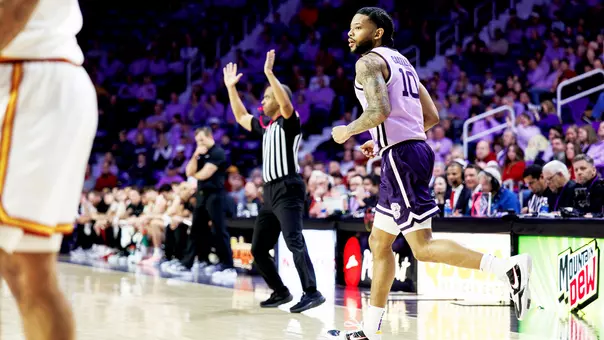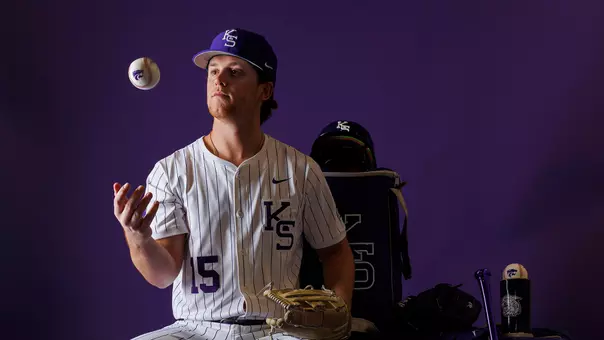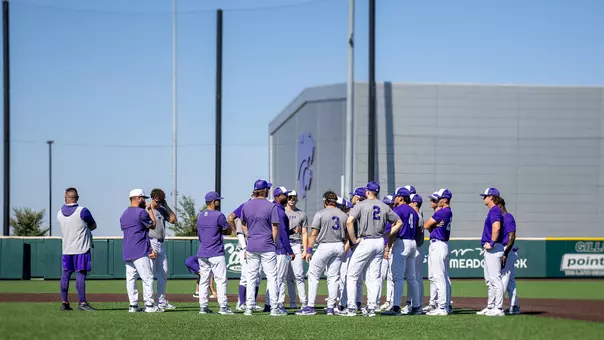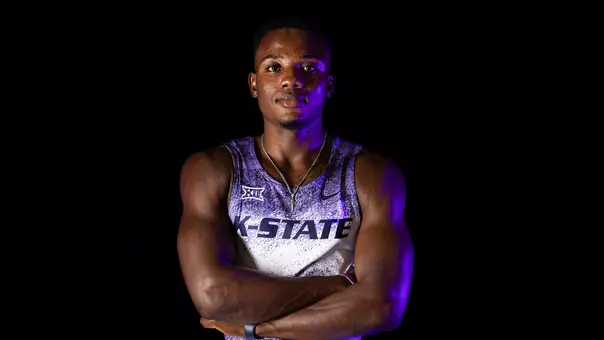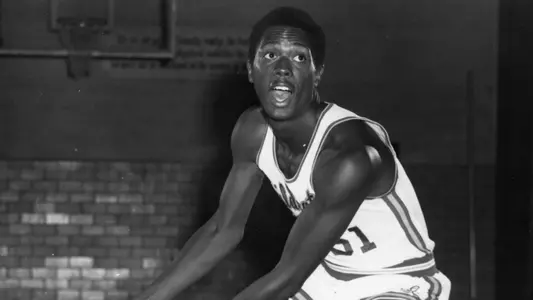
SE: The “Winston Rule” Rooted in K-State/Marquette History
Dec 07, 2021 | Men's Basketball, Sports Extra
By: D. Scott Fritchen
The Myriad Convention Center, the original centerpiece of Oklahoma City's first major urban renewal project, opened on November 5, 1972. Today, it is known as Prairie Surf Studios. West Sheridan Avenue is to the north, South Robinson Avenue is to the west, West Reno Avenue is to the south, and what is now known as South Edward King Gaylord Boulevard is to the east. The original Myriad housed the professional hockey team Oklahoma City Blazers. It supported a seating capacity of 10,000.
On evening of March 17, 1977, in a NCAA Midwest Regional Semifinals matchup between No. 16 Kansas State (24-6) and No. 7 Marquette (21-7), the pre-tournament favorite, a crowd of 10,185, mostly filled with purple, packed tightly into the Myriad. In the final seconds, they witnessed a travesty so profound that 12 days after Marquette won the 1977 NCAA Championship, the National Basketball Committee repealed the original rule.
This became known across college basketball as "The Winston Rule."
The original rule stated that a basket did not count if the ball was tipped in. A shot had to be ruled a "controlled shot" or a "controlled tip" to count. Usually, that meant that a rebounder had to have two-handed control of the ball.
And so begins the saga of Kansas State's Darryl Winston, a 6-foot-5, 220-pound senior center from Lovejoy, Illinois, who in 2018 was inducted into the Illinois Basketball Coaches Association Hall of Fame, but who in the final seconds of a 67-66 loss to Marquette incurred a hurt so deep that it spurred a resentment for Oklahoma City that lingered more than three decades.
That night. That game. And the shot that never counted.
Trailing 67-64 with 17 seconds remaining in the game, K-State's Mike Evans missed a long jumpshot, and, well, how else to explain it than to have Winston retell it, the shot and the story that haunted him for so long, which for the first five or six years, caused him to awaken in a cold sweat, which he prefers to say, "It stung, as you say in sports, and it stung for a while," which conjures visions of his wife, Sabrina, asking to pull over in Oklahoma City to sight see, how he gripped the steering wheel tight, gritted his teeth and pretended not to hear her request, which turns into casual conversation among old teammates, and oh how the stories always seem to steer into that city, that night, and that dreaded arena drenched in heartbreaking boos, toward the short referee, toward the nightmare, and toward the blasted interpretation of a rule that did not belong.
"When Evans took that shot, I ran to the offensive board," Winston begins. "I got a good angle on the ball and went up. When I went up, my first thought was to take the ball off the rim and dunk it. In the back of my mind, you've got to remember that Jack Hartman was our coach, and had I tried to dunk it and miss it, wow, so I gently controlled the ball with my fingertips. I laid it in — I was high above the rim with two hands — and as I laid it in, I felt the arm of Bo Ellis, a Marquette player, go across mine, which was a foul. Being a cerebral player and knowing the score, I thought, 'Yes! We are in the game!'
"There was no question I controlled the ball. I controlled it because I knew I couldn't miss it. I knew the ramifications of missing it, and then the whole time my teammates said, 'Man, you should've just dunked it.' But I didn't want to try to dunk it and miss the dunk, so I controlled it and I laid it in. Tip-ins are when guys flail at the ball and it goes in. That's a tip. This was not a tip. It was a controlled lay-in.
"On the floor, teammates came over and helped me up. We laughed. We smiled. We pump-fisted each other. I had made the shot and drawn the foul. I'd get a free throw to tie the game. Then as I went toward the free-throw line, the little referee came in and waved off my basket. I said, 'What do you mean? Why is it no good?' He turned to me and said, 'It's my decision. It's my decision to make that call.' Coach Hartman, I could tell by his face that he was angry. When you've been with a coach for four years, sometimes he doesn't have to say anything."

The score easily could've been 67-66 with Winston at the free-throw line, ready to send the game into overtime. Overtime — new life! Instead, the scoreboard inside the Myriad read "67-64," as the official ruled against Winston, and he stared at a one-and-one free-throw situation with 10 seconds remaining. Winston's lay-in wiped away, he retreated with his teammates toward the bench, where Hartman, then 131-61 in seven years as K-State head coach, and who had been one overtime loss to Syracuse from advancing to the 1975 Final Four, expertly kept his composure. Wearing his sports jacket and his necktie wagging as he spoke, steam came from Hartman's glasses, as he lectured in absolutes.
"That's what a great coach he was," Winston says. "He started talking about what we needed to do after I made the free throws. I stood there, and he said, 'After you make these two free throws, we're going to go to a man press!' The whole time, I'm thinking, 'I've got to make two free throws.' One thing great coaches do is keep their composure. I went to the free-throw line, looked at the bench, and Coach gave me a nice little nod, and that comforted me and took off the pressure. Still, that was the most pressure in my four-year career — shooting the one-and-one to at least put us down by one point and give us an opportunity.
"I swished both free throws."
Then Marquette ran out the clock.
Marquette 67, K-State 66. Final.
Winston, one of the team's standout players, a very fine scorer and rebounder, finished his final game with 12 points on 5 of 6 shooting from the floor, and he made 2 of 4 free throws, and he added 2 assists and 2 steals in 40 minutes.
"Mike's shot was missed, and Darryl tipped it in," Hartman told The Associated Press immediately after the game on March 17, 1977. "We figured since he was fouled while shooting it that it would surely be good. I think it was unfortunate that they missed the call, but I hesitate to say that. I don't want to say or suggest the call hurt us or cost us the ballgame, just that we were and still are confused by the call."
The confusion quickly turned to anger.
"No question, I was cringing," Winston says. "Cringing is the best word I can use. I had an empty feeling in my gut. Al McGuire had cancer and had announced he would retire after the season, and you and I both know that had something to do with the call. Coach McGuire came over to us after the game and said, 'You guys deserved to win.' That made me feel worse. After the game, players from both teams got together, and Bo Ellis, the young man who fouled me, said, 'Man, I thought my life was over! I thought I'd given the game away!' It was just so obvious that I had made a shot and there was a foul. It should've been a basket and an and-1."
Winston pauses.
"It was gut-wrenching," Winston says into his phone from his home in Topeka. "It was gut-wrenching."
He pauses again.
"Every time I see an and-1 tip-in and the guy goes to the free-throw line, I cringe. I just think, 'What could've been…what could've been. The irony about it is today I don't get tired talking about it."
Some people say that letting go changes your life. Winston, 66, doesn't fully buy into that philosophy. But he did return to Oklahoma City exactly 12,054 days — 33 years and 1 day — after he took the final shot of his K-State career. Why? Because his love of K-State, his love for the present, overpowered his disdain for the Myriad, his hate for the past. The date was March 18, 2010 when Winston, in his words, "finally broke down." He saw No. 7 K-State win a NCAA Tournament game. There was Frank Martin, Denis Clemente, Jacob Pullen, Curtis Kelly, Jamar Samuels, Dominique Sutton and Rodney McGruder. That game took place in the Ford Center, where across the street is the building formerly known as the Myriad.
And there was Darryl Winston, just within steps of where the shot never counted, cheering for his Wildcats.

"It made me feel good," Winston says. "People always say that it takes time to grieve, and it takes time to heal. I enjoyed seeing K-State get a victory in the NCAA Tournament."
Winston will be in attendance when K-State faces Marquette in the Big East/Big 12 Battle at 8 p.m. Wednesday at Bramlage Coliseum.
The memories will flood back again.
"That's been talked about for 45 years," he says. "My teammates and I still keep in contact — Mike Evans, Curtis Redding, Scott Langston, Keith Frazier and myself. We briefly talked about the Marquette game this last week and we'll talk about it again."
So much time has passed, but some things simply always remain.
For Winston, it's that night, that game, and the shot that never counted. The shot creeps into conversation with friends and people Winston meets. His daughter, Denise, says, 'Not again.' But, oh yes, people do talk about it. The Winston's return to Manhattan, stand around alumni, and without warning, conversation steers back to that old arena, toward the nightmare, and toward the blasted interpretation of a rule that did not belong.
"It still comes back," he says.
The cringe, too, returns. But the night sweats nightmares are long gone, replaced only with an emptiness that accompanies the fundamental question that has lingered with the Wildcats for nearly half a century: What if the shot had counted?
Of course, we'll never know, and college basketball players across the nation today probably will never know or will likely never fully understand the angst brought upon by a single rule so profoundly tragic that it spurred a change for college basketball.
The Winston Rule.
"I'll always bleed purple," Winston says. "I just hope there's no tip-in at the end of the game."
The Myriad Convention Center, the original centerpiece of Oklahoma City's first major urban renewal project, opened on November 5, 1972. Today, it is known as Prairie Surf Studios. West Sheridan Avenue is to the north, South Robinson Avenue is to the west, West Reno Avenue is to the south, and what is now known as South Edward King Gaylord Boulevard is to the east. The original Myriad housed the professional hockey team Oklahoma City Blazers. It supported a seating capacity of 10,000.
On evening of March 17, 1977, in a NCAA Midwest Regional Semifinals matchup between No. 16 Kansas State (24-6) and No. 7 Marquette (21-7), the pre-tournament favorite, a crowd of 10,185, mostly filled with purple, packed tightly into the Myriad. In the final seconds, they witnessed a travesty so profound that 12 days after Marquette won the 1977 NCAA Championship, the National Basketball Committee repealed the original rule.
This became known across college basketball as "The Winston Rule."
The original rule stated that a basket did not count if the ball was tipped in. A shot had to be ruled a "controlled shot" or a "controlled tip" to count. Usually, that meant that a rebounder had to have two-handed control of the ball.
And so begins the saga of Kansas State's Darryl Winston, a 6-foot-5, 220-pound senior center from Lovejoy, Illinois, who in 2018 was inducted into the Illinois Basketball Coaches Association Hall of Fame, but who in the final seconds of a 67-66 loss to Marquette incurred a hurt so deep that it spurred a resentment for Oklahoma City that lingered more than three decades.
That night. That game. And the shot that never counted.
Trailing 67-64 with 17 seconds remaining in the game, K-State's Mike Evans missed a long jumpshot, and, well, how else to explain it than to have Winston retell it, the shot and the story that haunted him for so long, which for the first five or six years, caused him to awaken in a cold sweat, which he prefers to say, "It stung, as you say in sports, and it stung for a while," which conjures visions of his wife, Sabrina, asking to pull over in Oklahoma City to sight see, how he gripped the steering wheel tight, gritted his teeth and pretended not to hear her request, which turns into casual conversation among old teammates, and oh how the stories always seem to steer into that city, that night, and that dreaded arena drenched in heartbreaking boos, toward the short referee, toward the nightmare, and toward the blasted interpretation of a rule that did not belong.
"When Evans took that shot, I ran to the offensive board," Winston begins. "I got a good angle on the ball and went up. When I went up, my first thought was to take the ball off the rim and dunk it. In the back of my mind, you've got to remember that Jack Hartman was our coach, and had I tried to dunk it and miss it, wow, so I gently controlled the ball with my fingertips. I laid it in — I was high above the rim with two hands — and as I laid it in, I felt the arm of Bo Ellis, a Marquette player, go across mine, which was a foul. Being a cerebral player and knowing the score, I thought, 'Yes! We are in the game!'
"There was no question I controlled the ball. I controlled it because I knew I couldn't miss it. I knew the ramifications of missing it, and then the whole time my teammates said, 'Man, you should've just dunked it.' But I didn't want to try to dunk it and miss the dunk, so I controlled it and I laid it in. Tip-ins are when guys flail at the ball and it goes in. That's a tip. This was not a tip. It was a controlled lay-in.
"On the floor, teammates came over and helped me up. We laughed. We smiled. We pump-fisted each other. I had made the shot and drawn the foul. I'd get a free throw to tie the game. Then as I went toward the free-throw line, the little referee came in and waved off my basket. I said, 'What do you mean? Why is it no good?' He turned to me and said, 'It's my decision. It's my decision to make that call.' Coach Hartman, I could tell by his face that he was angry. When you've been with a coach for four years, sometimes he doesn't have to say anything."

The score easily could've been 67-66 with Winston at the free-throw line, ready to send the game into overtime. Overtime — new life! Instead, the scoreboard inside the Myriad read "67-64," as the official ruled against Winston, and he stared at a one-and-one free-throw situation with 10 seconds remaining. Winston's lay-in wiped away, he retreated with his teammates toward the bench, where Hartman, then 131-61 in seven years as K-State head coach, and who had been one overtime loss to Syracuse from advancing to the 1975 Final Four, expertly kept his composure. Wearing his sports jacket and his necktie wagging as he spoke, steam came from Hartman's glasses, as he lectured in absolutes.
"That's what a great coach he was," Winston says. "He started talking about what we needed to do after I made the free throws. I stood there, and he said, 'After you make these two free throws, we're going to go to a man press!' The whole time, I'm thinking, 'I've got to make two free throws.' One thing great coaches do is keep their composure. I went to the free-throw line, looked at the bench, and Coach gave me a nice little nod, and that comforted me and took off the pressure. Still, that was the most pressure in my four-year career — shooting the one-and-one to at least put us down by one point and give us an opportunity.
"I swished both free throws."
Then Marquette ran out the clock.
Marquette 67, K-State 66. Final.
Winston, one of the team's standout players, a very fine scorer and rebounder, finished his final game with 12 points on 5 of 6 shooting from the floor, and he made 2 of 4 free throws, and he added 2 assists and 2 steals in 40 minutes.
"Mike's shot was missed, and Darryl tipped it in," Hartman told The Associated Press immediately after the game on March 17, 1977. "We figured since he was fouled while shooting it that it would surely be good. I think it was unfortunate that they missed the call, but I hesitate to say that. I don't want to say or suggest the call hurt us or cost us the ballgame, just that we were and still are confused by the call."
The confusion quickly turned to anger.
"No question, I was cringing," Winston says. "Cringing is the best word I can use. I had an empty feeling in my gut. Al McGuire had cancer and had announced he would retire after the season, and you and I both know that had something to do with the call. Coach McGuire came over to us after the game and said, 'You guys deserved to win.' That made me feel worse. After the game, players from both teams got together, and Bo Ellis, the young man who fouled me, said, 'Man, I thought my life was over! I thought I'd given the game away!' It was just so obvious that I had made a shot and there was a foul. It should've been a basket and an and-1."
Winston pauses.
"It was gut-wrenching," Winston says into his phone from his home in Topeka. "It was gut-wrenching."
He pauses again.
"Every time I see an and-1 tip-in and the guy goes to the free-throw line, I cringe. I just think, 'What could've been…what could've been. The irony about it is today I don't get tired talking about it."
Some people say that letting go changes your life. Winston, 66, doesn't fully buy into that philosophy. But he did return to Oklahoma City exactly 12,054 days — 33 years and 1 day — after he took the final shot of his K-State career. Why? Because his love of K-State, his love for the present, overpowered his disdain for the Myriad, his hate for the past. The date was March 18, 2010 when Winston, in his words, "finally broke down." He saw No. 7 K-State win a NCAA Tournament game. There was Frank Martin, Denis Clemente, Jacob Pullen, Curtis Kelly, Jamar Samuels, Dominique Sutton and Rodney McGruder. That game took place in the Ford Center, where across the street is the building formerly known as the Myriad.
And there was Darryl Winston, just within steps of where the shot never counted, cheering for his Wildcats.

"It made me feel good," Winston says. "People always say that it takes time to grieve, and it takes time to heal. I enjoyed seeing K-State get a victory in the NCAA Tournament."
Winston will be in attendance when K-State faces Marquette in the Big East/Big 12 Battle at 8 p.m. Wednesday at Bramlage Coliseum.
The memories will flood back again.
"That's been talked about for 45 years," he says. "My teammates and I still keep in contact — Mike Evans, Curtis Redding, Scott Langston, Keith Frazier and myself. We briefly talked about the Marquette game this last week and we'll talk about it again."
So much time has passed, but some things simply always remain.
For Winston, it's that night, that game, and the shot that never counted. The shot creeps into conversation with friends and people Winston meets. His daughter, Denise, says, 'Not again.' But, oh yes, people do talk about it. The Winston's return to Manhattan, stand around alumni, and without warning, conversation steers back to that old arena, toward the nightmare, and toward the blasted interpretation of a rule that did not belong.
"It still comes back," he says.
The cringe, too, returns. But the night sweats nightmares are long gone, replaced only with an emptiness that accompanies the fundamental question that has lingered with the Wildcats for nearly half a century: What if the shot had counted?
Of course, we'll never know, and college basketball players across the nation today probably will never know or will likely never fully understand the angst brought upon by a single rule so profoundly tragic that it spurred a change for college basketball.
The Winston Rule.
"I'll always bleed purple," Winston says. "I just hope there's no tip-in at the end of the game."
K-State Baseball | First Look - New Bats
Thursday, February 05
K-State Men's Basketball | Honoring Coach Jack Hartman
Wednesday, February 04
K-State Track & Field | DeLoss Dodds Invitational Recap
Wednesday, February 04
K-State Baseball | Media Day Press Conference - February 4, 2026
Wednesday, February 04
